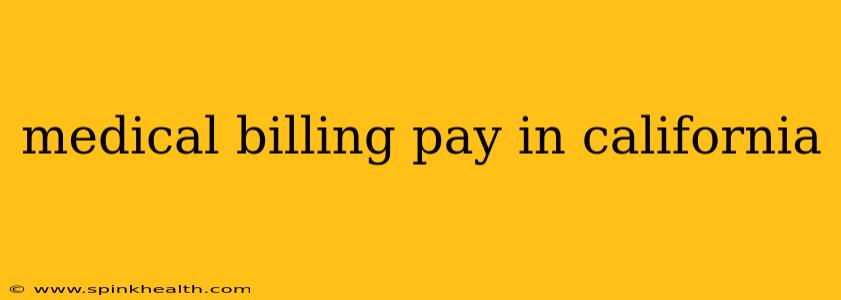California's medical billing landscape is complex, a vibrant tapestry woven with intricate regulations, diverse payment models, and a constant evolution driven by technological advancements and healthcare reform. Navigating this system successfully requires a deep understanding of its many threads. This guide unravels the mysteries, offering insights into the world of medical billing pay in the Golden State.
Let's begin our journey, tracing the path from the initial patient encounter to the final payment received.
How Much Do Medical Billers Make in California?
The salary of a medical biller in California varies significantly depending on factors like experience, location, employer type (hospital, clinic, private practice), and skillset. Entry-level positions might start around $40,000 annually, while experienced billers with specialized knowledge can earn upwards of $70,000 or more. Metropolitan areas like Los Angeles and San Francisco often command higher salaries. Beyond base pay, many positions offer benefits packages including health insurance, paid time off, and retirement plans.
What Are the Different Payment Methods for Medical Bills in California?
California's medical billing system accommodates a range of payment options. These include:
- Private Insurance: The majority of medical bills are paid through private health insurance plans. The specifics of coverage and reimbursement vary widely depending on the insurance provider and the patient's plan.
- Medicare and Medicaid: These government-sponsored programs provide healthcare coverage for seniors and low-income individuals, respectively. Billing and reimbursement processes under these programs are highly regulated.
- Self-Pay: When patients lack insurance, they become responsible for the entire cost of their care. Payment plans and financial assistance programs may be available.
- Managed Care Organizations (MCOs): Many Californians receive healthcare through MCOs, which negotiate rates with healthcare providers and manage the flow of payments.
What are the common challenges faced by medical billers in California?
The life of a medical biller isn't without its hurdles. Some common challenges include:
- Complex Insurance Regulations: Navigating the intricacies of different insurance plans, their varying coverage levels, and the constant updates to regulations can be incredibly demanding.
- Denials and Appeals: Insurance claims are frequently denied, necessitating meticulous appeals processes to secure payment. This requires strong attention to detail and knowledge of appeals procedures.
- Coding Accuracy: Precise and accurate medical coding is crucial for proper reimbursement. Errors can lead to claim denials and financial losses.
- Technological Advancements: Staying abreast of new technologies and billing software is essential to maintaining efficiency and accuracy.
- High Patient Volumes: In busy practices, medical billers often handle a large volume of claims, adding to the pressure.
What qualifications are needed to become a medical biller in California?
While formal education isn't always mandatory, many employers prefer candidates with a certificate or associate's degree in medical billing and coding. A strong grasp of medical terminology, anatomy, and physiology is critical. Proficiency in using medical billing software is also highly desirable.
What is the future of medical billing in California?
The future of medical billing in California is likely to be shaped by:
- Increased Technological Integration: Automation and Artificial Intelligence will play a larger role in streamlining billing processes.
- Value-Based Care Models: A shift towards value-based care may influence billing practices, focusing more on the outcomes of treatment rather than the number of services provided.
- Data Analytics: Analyzing billing data will become even more important for improving efficiency and identifying areas for improvement.
This exploration only scratches the surface of the intricate world of medical billing pay in California. The specifics can be incredibly nuanced, and staying up-to-date on regulations and best practices is vital for success in this dynamic field. Continuous learning and professional development are key for those seeking a career in this rewarding yet challenging profession.

